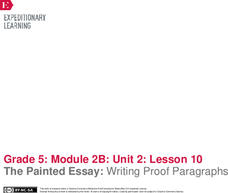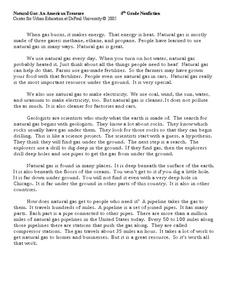Bonneville
Photovoltaic Solutions "Shark-Tank Style"
Come up with a great idea and change the world for the better. Working in groups of three, learners apply their knowledge of photovoltaic systems to design a battery-powered electric vehicle capable of replacing gas-powered cars. They...
EngageNY
The Painted Essay: Writing Proof Paragraphs
Words of proof. Learners continue coding The Electric Motor by marking the first point in yellow and the second point in blue. They discuss the structure of the paragraphs by identifying transition words and evidence to support the given...
EngageNY
The Painted Essay: Developing a Conclusion and Adding Linking Words
In conclusion ... this essay is the best! Scholars continue working on their painted essays by creating the conclusion. They work in groups to analyze the concluding paragraph in the model painted essay, The Electric Motor. After...
EngageNY
The Painted Essay: The Introductory Paragraph
Mimic the model for the perfect essay. Scholars work in groups to analyze a model painted essay The Electric Motor. They compare the structure of the model essay to the painted essay template they created in the previous activity. The...
Institute of Electrical and Electronics Engineers
Working with Watermills
In collaborative groups, emerging engineers or environmental scientists plan and construct a water wheel or watermill that rotates for a total of three minutes. Everything you need to carry out this lesson is included: objectives,...
Carnegie Mellon University
How Power Plants Work 1
First of three lessons, this is a great start to a unit on energy. As you demonstrate, learners discover different types of energy and how it is converted from one form to another. They then focus in on the generation of electricity by...
LABScI
Circuits Lab: Lightbulbs
Electrons flow from negative to positive, but the general consensus is that current flows from positive to negative. Scholars explore current through construction of circuits in both series and parallel. The focus is on voltage,...
DiscoverE
Design a Wind Turbine
Discover the power of wind energy. Learners design, build, and test wind blades in a hands-on experiment. They analyze the results to determine if they can make any improvements before gathering as a class to discuss their designs.
Teach Engineering
Can You Resist This?
Some things are hard to resist. Small collaborative groups build circuits and calculate the voltage using Ohm's Law. Budding engineers explore the connection between the voltage across different resistors and linear functions with...
Teach Engineering
Maximum Power Point
Investigate the maximum power output of a photovoltaic panel with a lesson that introduces the class to the maximum power point. Individuals learn how to determine the maximum power point of a solar panel by using Ohm's law and the power...
Teach Engineering
Ice, Ice, PV!
Knowing the temperature coefficient allows for the calculation of voltage output at any temperature. Groups conduct an experiment to determine the effects of temperature on the power output of a solar panel. The teams alter the...
PBS
Hidden Alarm
It's time! The fourth lesson in a five-part series has teams of scholars build a circuit for an alarm. A switch lets them turn the alarm on and off and allows them to hide the alarm—just as long as they don't hide it in the classroom!
Curated OER
Natural Gas: An American Treasure
Do your fourth graders need extra practice with evaluating fact and opinion? An informative resource provides two reading passages in which learners distinguish sentences as fact or as opinion. Additionally, they determine how the...
It's About Time
Building a Motor/Generator Toy
Combine science and playtime with the final lesson in an innovative unit. Scholars apply everything they have learned in previous lessons to build their own motors/generators and use it in a toy of their own design.
NOAA
Oceans of Energy
Are the earth's oceans really just giant batteries, waiting for their energy to be harnessed? Middle school mechanical engineers will be shocked by the amazing amount of energy that forms around them after diving into part four of a...
It's About Time
Exploring Energy Resource Concepts
Please turn off the lights to conserve energy. Or not, after all energy is always conserved. This first lesson in an eight-part series includes three parts. Part A contains one hands-on activity and two inquiry-based experiments on heat...
Teach Engineering
Concentrating on the Sun with PVs
Concentrate to determine the best reflector design. Pairs use the engineering design process to build a reflector to increase the current output of a photovotaic panel. Teams arrive at a final design and present it to the class along...
Columbus City Schools
Transformation: Energy in Disguise
Energy transformations happen everywhere, every second of the day. The energy transformation common to most scholars is potential and kinetic energy. The three-week lesson covers multiple types of energy transformations through...
DiscoverE
Make a Light Bulb
Could you reinvent the light bulb? Scholars tap into their inner Thomas Edisons to build a light bulb prototype out of a jar and some wires. They see how long the filament wire glows in the jar (batteries not included) to measure their...
New Jersey Historical Commission and New Jersey Council for the Humanities
Thomas Edison: The Wizard of Menlo Park
What would change in your daily life due to a power outage? Here, learners explore the inventions brought to us by the one and only, Thomas Edison, and imagine a day without them. Scholars take part in a grand conversation and write a...
Teach Engineering
The Grid
Upper graders form a "Presidential Task Force," and attempt to make recommendations concerning the future of the national power grid. After a teacher-led discussion which proves that our nation's energy consumption will soon outpace our...
Science Matters
Forms of Energy
The amount of energy Americans use doubles every 20 years. The first lesson in a 10-part series teaches scholars about different forms of energy. They rotate through five stations with hands-on activities or experiments at each in order...
Government of South Australia
Don't Waste Your Energy
Don't lift another finger, this physical and environmental science unit has everything you need to begin teaching your class about energy. Starting with a look at the greenhouse effect, these lessons and activities take young scientists...
Bonneville
Engaging with Solar Panels
Build a fan and become a fan of solar power. The second of 14 lessons in the Cost Effective Solar Cells unit has learners first construct circuits with solar cells to power a fan, a motor, and an LED. They then test their circuits both...
Other popular searches
- Static Electricity
- Electricity and Magnetism
- Electricity Experiments
- Current Electricity
- Basic Electricity
- Science Static Electricity
- Science Electricity
- Basic Electricity Worksheets
- Electricity and Light Bulb
- Electricity Circuits
- Electricity Magnet
- Electricity Lesson Plans
























